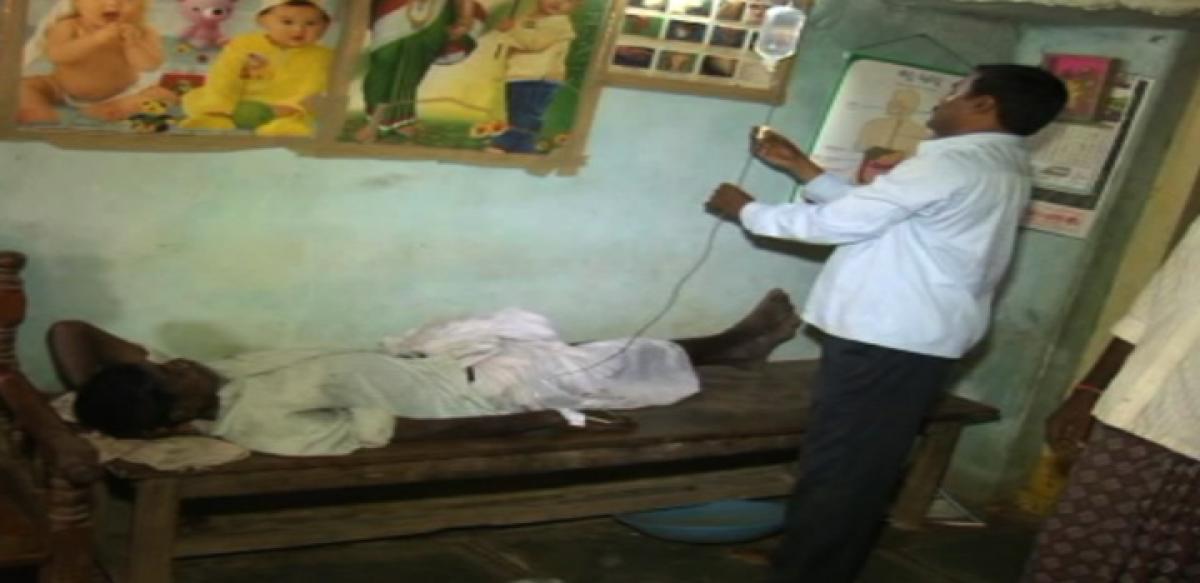Live
- Govt unveils ‘Jalvahak’ to boost inland waterways
- List of criminals: Delhi BJP chief on AAP panel of 38 candidates
- PSBs in India clock record Rs 1.41 lakh crore in net profit in FY24
- Telangana Government Announces Key Development Plans: Bhatti Vikramarka
- Crackdown on illegal poppy farming in Manipur: Assam Rifles destroyed 6,228 acres in 5 years
- South Korea's ruling party leader cancels press conference amid calls for resignation
- AIADMK's big meet discusses 2026 polls, prospective alliances
- BJP questions Congress-Shiv Sena (UBT) alliance over Aaditya Thackeray's Savarkar-Nehru remark
- Maha Oppn to boycott customary CM tea meet, cites rising farmers' distress, atrocities against Dalits
- Mikheil Kavelashvili is new Georgian President
Just In

The sorry state of affairs in government hospitals across the State reflects the fact that they are not in the pink of health. They are plagued by poor infrastructure affecting quality of services offered to the poor. With the advent of summer, the woes of patients and their attendants are compounded as hospitals face acute drinking water shortage.
Hyderabad: The sorry state of affairs in government hospitals across the State reflects the fact that they are not in the pink of health. They are plagued by poor infrastructure affecting quality of services offered to the poor. With the advent of summer, the woes of patients and their attendants are compounded as hospitals face acute drinking water shortage.
Patients and their attendants are forced to purchase mineral water to quench their thirst. Dysfunctional overhead tanks, paralysed treatment plants, unhygienic toilets, dried taps present the grim supply scenario in government hospitals. Patients apprehend that drinking unhygienic water will aggravate their problems. Taking advantage private traders are looting people.
Patients visiting government hospitals in Telangana, including the famed one in Warangal and the attendants are forced to buy water as most treatment plants in many hospitals are found to be out of order. Patients sarcastically comment they incur more expenditure on water, than drugs and disposables.
The Mahbubnagar government hospital faces severe shortage daily in the afternoon; it is somewhat better during mornings and nights. Bore-wells are not yielding enough due alarming decline in groundwater table due to drought. The hospital gets seven municipal tankers a day which is highly inadequate. Although there is a pipeline connection from the Ramanpadu reservoir, it does not get water daily.
The Re 1 a litre scheme has failed, as the vending machine is defunct. In the absence of a display board, poor patients anxiously wait after dropping a Re 1 coin. The attendants are worst sufferers because of non-availability of water for their morning ablutions.
Speaking to The Hans India, GGH Superintendent Rambabu admitted that the water shortage was acute. ``We have initiated measures to overcome the problem. A survey has been conducted to sink a borewell to augment the supply. We are making concrete efforts to solve the problem on a permanent basis,’’ he said. Expressing dismay, some patients complained that no steps have been initiated to solve the issue though Health Minister C Laxma Reddy hails from the district.
While commenting on the supply in Khammam government hospital, patients accused authorities of making available unhygienic water through taps. Some even say people vomit as soon as they drink from overhead tank. In fluoride-affected Nalgonda district, patients visiting hospitals say the overhead tank is only ornamental as water rarely flows through taps. They are buying at Rs 2 half liter. The famed MGM which is described as nerve center of all hospitals, the three plants have been shelved. On an average, 2,000 outpatients visit daily for treatment.
At Janagoan Area Hospital, RMO Dr Sugunakar Raju brushes the issue under the carpet as if it is not a problem at all. In Narsampeta Agency area patients complain that the tap water emits a foul smell as the overhead tank has not been cleaned for ages. The only borewell has gone dry. While the Khammam GGH present a worst scenario with patients complaining of vomiting, the situation in Bhadrachalm Area Hospital is somewhat better since they get clean supply from a treatment plant set up with the patronage of the Singareni Collieries Company Ltd.
Toilets in the Rajiv Gandhi Institute of Medical Sciences (RIMS), Adilabad, are in utter unhygienic conditions for want of flush out facilities. Sanitation in Mancherial Area Hospital is worst as patients are finding it difficult to cope with foul smell.

© 2024 Hyderabad Media House Limited/The Hans India. All rights reserved. Powered by hocalwire.com







